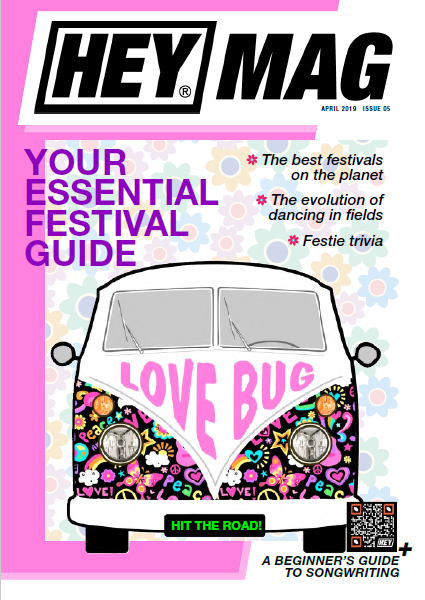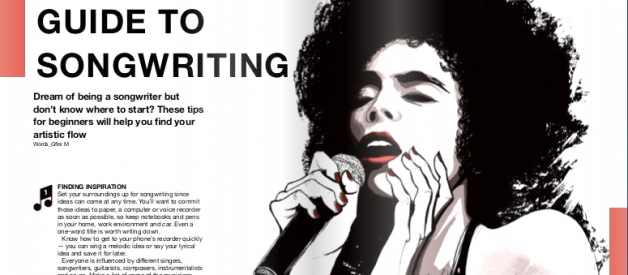Dream of being a songwriter but don?t know where to start? These tips for beginners will help you find your artistic flow. Words Gfire M [First published in Hey Mag, April 2019]
FINDING INSPIRATIONSet your surroundings up for songwriting since ideas can come at any time. You?ll want to commit those ideas to paper, a computer or voice recorder as soon as possible, so keep notebooks and pens in your home, work environment and car. Even a one-word title is worth writing down.
Know how to get to your phone?s recorder quickly ? you can sing a melodic idea or say your lyrical idea and save it for later.
Everyone is influenced by different singers, songwriters, guitarists, composers, instrumentalists and so on. Make a list of some of the musicians and songs that have meaning for you. Keep a playlist of inspirational tunes to keep yourself continually inspired.
 Hey Mag, April 2019
Hey Mag, April 2019
DETERMINE YOUR SONG?S STRUCTUREAnalysing songs you enjoy will give you an idea of some of the different structures you can use. And as you learn to write songs, you can play around with different types of song structures.
Example 1 ? The simplest structure is that in which there is only one type of lyric, the verse (we call it ?A?). The classic Gershwin tune Summertime has an A-A structure, with only two verses.
Example 2 ? Songs with both verses and choruses have two types of lyrics ? we call the verse ?A? and the chorus ?B?. The famous Bob Dylan song Blowin? in the Wind has this type of structure ? A-B-A-B-A-B.
Example 3 ? Other songs are more complex. They may have verses, choruses and a bridge (which we call ?C?). The Beatles? Ticket to Ride is one of these songs with an A-B-A-B-C-A-B structure. Listen to it here.
HOW TO WRITE LYRICSWherever you start, it can be helpful to describe the entire scope of your song in a single sentence. This will help you stay focused. For Ticket to Ride, for example, the sentence could be ?My girlfriend is moving away from me and I am sad, but she doesn?t care.?
A song is a very short form of art so it is essential to tie it together with just one idea. If you have too many ideas, break them apart and write a different song for each idea instead of trying to pile too much into one song. You don?t have to create an entire song in one sitting ? you could just create one verse or one chorus and keep coming back to add more lyrics as you become inspired.
WRITING THE MELODY AND CHORDSAs you experiment with different melodies and chords, this is a perfect time to use some sort of recorder on your phone or on your computer. Try simply singing your lyrics in different ways at least three times, then listen back to your recording and see if you have any keepers.
You could also start with some chords instead. Play some chord progressions on guitar or piano and record those. Then try out some melodies against those chords using your lyrics. Or you could try both chords and melodies at the same time.
If you?re having trouble coming up with a chord progression, you could always ?borrow? one from another song. Choose a song in a similar style and tempo to yours and combine the chords with your own lyrics. Just make sure that you don?t copy the actual melody of your borrowed tune. Song melodies are protected by copyright law but chord progressions are not.
WRITING YOUR SONG?S TITLEYour song needs a great title! Many songwriters use the ?hook? or repeated words from the chorus as the title of the song. Other songs use a descriptive term as the title that is not contained in the lyrics at all.
FINAL STEPSOnce you?ve finished, set your song aside for a few days and don?t think about it. When you come back to it with fresh eyes and ears, you?ll be able to identify lyrics that need tweaking, chords that need adjusting or other small details to really make the song pop.
Consider testing your songs out live. Performing in front of others ? whether at an open mic night or simply in front of your music teacher ? will help you iron out any kinks.
Another great idea is to record your song. With technology today, it?s easy to record your own songs with the right software and a quality microphone. Publish your recordings online so potential fans, other artists and established people in the music business can hear your work and discover your talent.
If you?re interested in honing your songwriting skills why not obtain professional instruction from tutors at takelessons.com?
****
 Hey Mag, April 2019
Hey Mag, April 2019
Read more about music ? across all genres, in the April 2019 issue of Hey Mag HERE
Sign up to the Hey Music newsletter ? www.heymags.com


